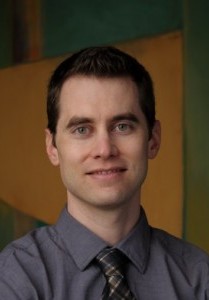Dr. Randal Halfmann, ’04, took a bachelor’s in genetics from TAMU before completing his doctorate in biology at MIT. Dr. Halfmann is the recipient of the UT Southwestern Sara and Frank McKnight Fellowship and the NIH Early Independence Award. These awards are designed to help talented young scientists engage in research as principal investigators, bypassing traditional postdoctoral training under the supervision of more senior faculty. Dr. Halfmann’s work with prions was highlighted in the January 2014 issue of The Scientist (see “The Bright Side of Prions”).

Dr. David Stelly, who served as faculty mentor for Dr. Halfmann’s undergraduate thesis, commented, “Randal was an outstanding undergraduate genetics student, student worker and Honors [University Undergraduate Research] Fellow…it was a real pleasure having him in our group.” Dr. Stelly noted that, even as an undergraduate, Dr. Halfmann did not shy away from challenge. “For his Honors Research project, he took on a project that was not being investigated in the lab but of great relevance. [It was an] extremely challenging topic, trying to devise systems for cell cycle synchronization and chromosome doubling in plant in vivo systems.”
Dr. Halfmann took some time to respond to our questions about his experience as an undergraduate in Honors at Texas A&M, and how his experience has helped to shape his current success.
How did you end up at Texas A&M?
I never seriously considered any other college. Having grown up on a ranch in rural west Texas, and with several Aggies in my family, A&M always felt like the natural choice. But what sealed the deal was my involvement in FFA in high school. In addition to nurturing an interest in applied biology, FFA also yielded the tangible reward of a sizable scholarship to be applied towards an ag major. Luckily, the Genetics program is in the college of Ag and Life Sciences at A&M. So it was a perfect match.
What are your favorite memories of your time at Texas A&M?
I have so many great memories of A&M, from football games to Northgate to to over-caffeinated all-night study sessions. Many of my fondest memories are from my freshman year in Lechner Hall. It was very formative for me, so much so that I would consider honors housing to be one of the major perks of the Honors program. I was surrounded by diverse, driven, incredible people, all of whom were inspiring and some of whom have become lifelong friends. Finally, I cannot forget the emotionally charged A&M vs. OU game of Sept. 22, 2001. The “Red, White, and Blue-Out” of Kyle Field that followed the 9/11 terrorist attack stamped an indelible sense of unity and belonging, and affirmed my faith in the power of individuals to make a difference. I have never been so proud to be an Aggie.
In what aspects of the Honors Program did you participate?
I came into A&M with a Lechner Scholarship, which provided an allowance for studying abroad. So the summer of my sophomore year, I attended the University of Copenhagen as part of Denmark’s International Studies program. While there I lived with a Danish family and was immersed in a completely different environment – physically, culturally, and politically – than anything I could have experienced back in the US. Needless to say I returned home with a deep appreciation for diversity. I honestly would not have considered that opportunity if it weren’t for the honors scholarship.
I actively participated in Honors Student Council, where I became the VP of Public Relations and worked with other members to improve visibility of honors programs on campus.
I was a University Scholar, which grouped me thenceforth among the academic crème de la crème of my classmates. I was exposed to the movers and shakers on campus, and benefited from regular, small scale seminars with faculty and other University Scholars.
I was also an Undergraduate Research Fellow with Dr. David Stelly. My thesis: “Towards Improved Methods for Cell Cycle Manipulation and Chromosome Doubling in Cotton”.
How did your research experience shape your career path?
Working with Dr. Stelly was by far the most formative experience for my subsequent research career. He is a top notch mentor, and he cares intensely for his students. He provided just the right amount of direction for my project and gave me free reign of the lab, which I took full advantage of. He encouraged me to attend conferences, helped me choose a grad school, and to apply for a graduate fellowship that would subsequently pave my way at MIT. I spent a LOT of time in the lab, and found myself thinking about strategies for chromosome doubling even when I wasn’t there. Having something like that to devote one’s creative time and energy to, and to see it reach fruition, was immensely fulfilling. The objects of my scientific curiosity have changed, but the passion that was born in that first research experience continues to get stronger.
What advice can you offer Honors students as they look forward to an uncertain future after college?
I can’t emphasize enough the importance of getting deep, firsthand experience in your chosen career. Take every available opportunity.
Honors and Undergraduate Research is grateful to the students, faculty, and staff that make programs like the Honors Housing Community, University Scholars, and Undergraduate Research such a transformative experience. We could not put these programs on without the generous support of the Association of Former Students.
We love to share news and success stories from our Honors Former Students! If you have something to share with our current, former, and prospective students and their families, please contact honors@tamu.edu.
